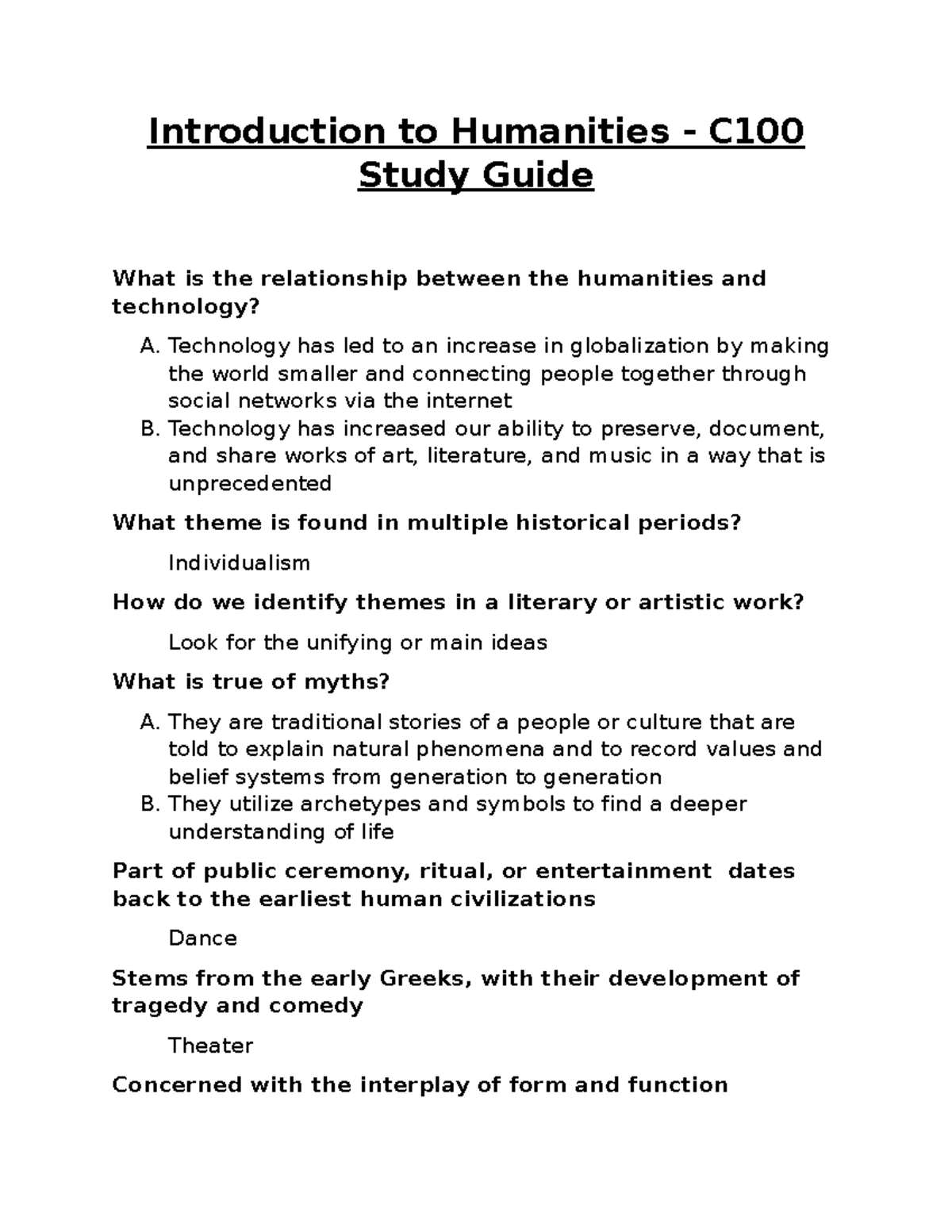Embarking on an exploration of the arts and humanities can be a transformative experience, especially for first-year students diving into introductory humanities courses. At Harvard, a vibrant arts and humanities initiative aims to rekindle interest in these essential fields with a fresh and engaging first-year humanities curriculum. With nine new courses launching this academic year, students will find captivating opportunities that emphasize critical thinking and creativity, bridging traditional teachings with contemporary relevance. This renewed focus is designed not only to combat the declining enrollment trend but to ignite a passion for the humanities within a diverse student body. Ultimately, an engaging humanities education reveals the intrinsic value of understanding the human condition through literature, philosophy, and culture.
Beginning your academic journey with courses in liberal arts and cultural studies offers students a profound opportunity to connect with the foundational aspects of human knowledge. The introduction to humanities classes, part of a broader arts initiative, fosters an atmosphere where curiosity and critical inquiry thrive. By reimagining the first-year humanities curriculum, educators aim to captivate and inspire students with interactive and thought-provoking content. This approach not only addresses challenges in enrollment but also cultivates a deeper appreciation for the arts and humanities among students. Engaging in such a stimulating educational environment enables students to explore their interests and connect with the core values of human expression.
Introduction to Humanities Courses: Engaging First-Year Students
The introduction to humanities courses offered at Harvard University represents a determined effort to engage first-year students in the intellectual exploration of arts and culture. Dean Sean Kelly and his team have crafted nine new introductory courses aimed at capturing the interest of students who may gravitate away from these fields due to a lack of compelling offerings. This initiative is a response to the troubling trend of declining enrollment in arts and humanities, emphasizing the necessity to present humanities as a vital component of a well-rounded education.
By focusing on themes that resonate with students’ experiences and encouraging critical thinking, these courses aim to invite students into the realms of human culture, creativity, and expression. For instance, classes like “Introduction to the Medical and Health Humanities” exemplify the blend of personal relevance and academic rigor that can inspire first-year students to appreciate the significance of their studies within a broader societal context.
The Arts and Humanities Initiative at Harvard
The arts and humanities initiative launched by Dean Sean Kelly at Harvard signifies a pivotal shift towards revitalizing student interest in these disciplines. By developing courses that align with contemporary issues and student experiences, the initiative aims to reverse the trend of diminishing engagement with humanities subjects. This innovative approach encourages a reevaluation of how introductory humanities courses can be designed to excite and stimulate students, ensuring that the relevance of these fields resonates across diverse student backgrounds.
Moreover, the initiative reflects a deeper understanding of the challenges faced by students as they navigate their academic paths. With approximately half of first-year students changing their minds about pursuing humanities studies, the initiative seeks to formulate engaging curricula that illuminate the intrinsic value of understanding human culture and creativity. By fostering an environment where students can delve into profound philosophical questions and cultural narratives, the initiative aims to cement the role of the humanities in shaping thoughtful and empathetic individuals.
First-Year Humanities Curriculum: A New Approach
The first-year humanities curriculum at Harvard has undergone a transformation aimed at attracting and retaining students interested in this vital area of study. Through courses that introduce fundamental questions about human existence and creativity, the curriculum seeks to illustrate not only the academic rigor of humanities but also its practical relevance in understanding the world. This streamlined approach emphasizes gaining insight into various artistic and cultural forms while simultaneously developing critical analytic skills.
Courses like “Bob Dylan the Classic” and “Migration and Border Crossing in Film and Photography” serve as excellent examples of the curriculum’s fresh take on engaging students with relevant themes that shape contemporary society. By linking historical and artistic explorations to current global issues, the curriculum invites first-year students to see humanities as not just subjects to study, but as essential lenses through which to view their own experiences and the world around them.
The Importance of Engaging Humanities Education
Engaging humanities education is crucial for fostering a deeper understanding of human experiences and cultural expressions. By shifting the focus of introductory courses from rote learning to exploration and critical engagement, educators can ignite students’ passions and encourage them to dive into the rich tapestry of human thought. This approach not only reflects the diverse interests of students today but also prepares them for meaningful participation in society by cultivating their analytical and empathetic skills.
Courses designed under this new initiative motivate students to consider important questions about morality, identity, and the human condition, allowing them to critically analyze texts and ideas that have shaped societies. This active participation in learning transforms the educational experience, making humanities more accessible and relevant to students who may initially feel disconnected from traditional models of humanities education.
Creating a Collaborative Humanities Learning Environment
A collaborative humanities learning environment is essential for enhancing student engagement and promoting a community of shared learning and discovery. By encouraging collaborative projects and interdisciplinary studies, the new curriculum emphasizes the interconnectedness of various humanities disciplines. This approach not only enriches students’ academic experience but also builds a supportive network where students can share ideas, challenge assumptions, and grow intellectually together.
Faculty-led discussions and peer-to-peer exchanges foster a dynamic learning atmosphere that allows students to explore creative avenues and delve deeper into their subjects. Collaborative learning environments enhance the educational experience, enabling students to connect with their peers on a more personal level while exploring the breadth of the humanities in innovative ways. Ultimately, such collaboration is essential for cultivating a vibrant and engaging educational culture that resonates with students.
Navigating the Canon Wars: Contemporary Perspectives in Humanities Courses
The ‘Canon Wars’ that took place in the late 20th century have significantly impacted how introductory humanities courses are taught today. These debates surrounding which texts dominate the curriculum have led to a more inclusive and varied selection of course materials in an effort to broaden students’ understanding of what constitutes essential works in the humanities. Contemporary perspectives now encourage diversifying the curriculum to include voices that were previously marginalized or overlooked, contributing to a richer educational experience.
Courses like “Humanity, Technology, and Creation” and “Translation and the Craft of Reading Carefully: A World Literature Introduction” reflect an enriched curriculum that not only honors traditional texts but also engages with diverse narratives. This shift towards a more holistic curriculum allows first-year students to explore the vast landscapes of human thought, ensuring they are equipped to navigate complex discussions about culture, identity, and morality. Such an approach is vital for fostering a comprehensive understanding of what it means to study and engage with the humanities today.
Emphasizing the Intrinsic Value of Humanities Studies
One of the core goals of the new introductory courses is to underscore the intrinsic value of humanities studies, beyond their instrumental applications. Dean Kelly emphasizes the importance of allowing students to appreciate humanities as a field that fosters critical thinking, creativity, and a sense of belonging in the world. By framing humanities education in terms of its inherent worth rather than merely its utility, students are encouraged to engage with the material in a deeper, more meaningful way.
This focus on intrinsic value positions humanities as essential to the human experience, encouraging students to contemplate significant questions about existence, society, and ethics through literature, philosophy, and the arts. Courses designed with this emphasis invite students to explore timeless themes of humanity and gain insight into what it means to be an engaged member of a diverse society. Such a perspective helps to cultivate a lifelong appreciation for the arts and humanities, making clear their relevance in everyday life.
Fostering a Love for Literature Through Engaging Curricula
Fostering a love for literature is a central tenet of the new humanities courses at Harvard. By integrating creative writing with critical reading, courses such as “Reading for Fiction Writers” emphasize the interconnectedness of consuming and producing literature. Students are encouraged to deeply engage with a range of texts, which cultivates their appreciation for literature while simultaneously developing their own narrative skills.
As students analyze works by influential authors like Anton Chekhov and Octavia Butler, they are not only learning about different narrative techniques but also discovering the power of storytelling in shaping human experiences. This approach allows first-year students to recognize literature as a transformative force, giving them the tools to express their own voices and understand the cultural dialogues that inform their identities.
Conclusion: The Future of Humanities at Harvard
The future of humanities at Harvard looks promising as the new initiatives and introductory courses pave the way for increased student engagement and interest. By rethinking the approach to humanities education and placing greater emphasis on the intrinsic and practical values, the institution is poised to reshape student perceptions of these important fields. The dedication of faculty and administration to invigorate the arts and humanities underscores a commitment to cultivating critical thinkers and compassionate individuals.
As students navigate their first year with these innovative courses, the hope is that they will walk away with a deeper understanding of human culture, a strengthened sense of community, and an enduring appreciation for the arts and humanities. The success of this initiative may inspire other institutions to adopt similar models, ensuring that the humanities continue to thrive as a cornerstone of higher education.
Frequently Asked Questions
What are introductory humanities courses and why are they important?
Introductory humanities courses are foundational classes designed to engage first-year students in the exploration of arts and humanities. They are crucial for fostering critical thinking, cultural awareness, and understanding of human experiences. These courses help students connect with essential texts and ideas, stimulating interest in humanities fields.
How does the arts and humanities initiative at Harvard aim to enhance student engagement?
The arts and humanities initiative at Harvard focuses on redefining the first-year humanities curriculum by launching new, engaging introductory courses. This approach aims to increase student enrollment in these essential fields and help students connect with the intrinsic value of humanities studies.
What can students expect from the new first-year humanities curriculum at Harvard?
Students can expect a diverse range of engaging introductory humanities courses, including topics like ‘Introduction to the Medical and Health Humanities’ and ‘Migration and Border Crossing in Film and Photography.’ These courses are designed to pique interest and emphasize the importance of understanding human culture and history.
Why is engaging humanities education critical for first-year students?
Engaging humanities education is critical for first-year students as it helps them develop analytical skills, fosters empathy, and enhances their understanding of cultural narratives. By participating in introductory humanities courses, students are better equipped to explore complex questions about human existence and society.
What topics will be covered in Harvard’s introductory arts and humanities courses?
Harvard’s introductory arts and humanities courses will cover a variety of topics, including literature, philosophy, film studies, and cultural theory. Examples include ‘Bob Dylan the Classic’ and ‘Humanity, Technology, and Creation,’ allowing students to explore different dimensions of the humanities.
How do Harvard’s introductory humanities courses address declining enrollment in these fields?
Harvard’s introductory humanities courses address declining enrollment by providing innovative and relevant content that resonates with students’ interests. By revamping the curriculum to include contemporary issues and diverse perspectives, the initiative aims to attract more first-year students to the arts and humanities.
What role do faculty play in shaping the introduction to humanities courses at Harvard?
Faculty play a pivotal role in shaping the introduction to humanities courses at Harvard by designing engaging class content and facilitating discussions around important cultural and philosophical questions. Their expertise helps ensure that these courses are compelling and intellectually stimulating for students.
How does the introductory humanities curriculum at Harvard prepare students for future studies?
The introductory humanities curriculum at Harvard prepares students for future studies by establishing a foundational understanding of important themes, texts, and methodologies within the humanities. This groundwork helps students identify their academic interests and guides them in selecting concentrations that align with their passions.
What benefits do students gain from taking introductory humanities courses?
Students gain numerous benefits from taking introductory humanities courses, such as improved critical thinking skills, enhanced communication abilities, and a deeper understanding of diverse cultures and perspectives. These courses promote personal growth and help students navigate complex social issues.
Why is the intrinsic value of humanities education emphasized in Harvard’s new course initiative?
The intrinsic value of humanities education is emphasized in Harvard’s new course initiative to highlight the essential role these disciplines play in understanding the human experience. By focusing on the inherent worth of studying literature, philosophy, and art, the initiative aims to inspire students to appreciate the transformative power of the humanities.
| Key Focus Areas | Details |
|---|---|
| New Introductory Courses | Nine new courses introduced in the Division of Arts and Humanities to engage first-year students. |
| Faculty Involvement | Professors including Sean Kelly, Karen Thornber, and others are leading these courses. |
| Addressing Enrollment Challenges | Initiative aims to counter declining enrollment in arts and humanities by making courses more appealing. |
| Diverse Course Topics | Courses range from Medical Humanities to Migration in Film, highlighting varied aspects of human culture. |
| Learning Beyond Academics | Courses aim to foster critical thinking and understanding of human experiences beyond vocational needs. |
| Intrinsic Value of Humanities | Focus on the importance of studying literature, philosophy, and arts for personal growth and understanding. |
Summary
Introduction to humanities courses is increasingly vital in engaging freshmen and shifting their perspectives on the importance of arts and humanities studies. As seen at Harvard, a thoughtful approach to course design aims to reignite student interest by offering a rich variety of topics that highlight the intrinsic value of these disciplines. This initiative, led by Dean Sean Kelly, emphasizes teaching students not only the historical significance of great works but also their relevance to contemporary human experiences and personal identity. By creating a vibrant curriculum that resonates with students’ interests, these humanities courses aim to foster a lifelong appreciation for the arts and cultures that shape our world.


